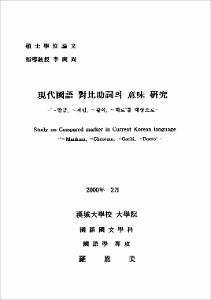現代國語 對比助詞의 意味硏究
- Files in This Item:
-
-
Download
 000000065940.pdf
기타 데이터 / 2.85 MB / Adobe PDF
000000065940.pdf
기타 데이터 / 2.85 MB / Adobe PDF
-
Items in Repository are protected by copyright, with all rights reserved, unless otherwise indicated.
 000000065940.pdf
기타 데이터 / 2.85 MB / Adobe PDF
000000065940.pdf
기타 데이터 / 2.85 MB / Adobe PDFItems in Repository are protected by copyright, with all rights reserved, unless otherwise indicated.